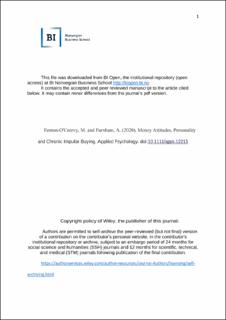Money Attitudes, Personality and Chronic Impulse Buying
Journal article, Peer reviewed
Accepted version
Permanent lenke
https://hdl.handle.net/11250/2657380Utgivelsesdato
2019Metadata
Vis full innførselSamlinger
- Publikasjoner fra CRIStin - BI [1013]
- Scientific articles [2173]
Sammendrag
This paper reports on a study of the relationship between demographic, personality, and attitudinal variables and impulsive buying (a consumer's tendency to buy spontaneously, unreflectively, and immediately); using secondary analysis of data from common participants in two large national surveys of British adults: one survey contributing data on impulsive buying, demographics, and money attitudes; and the second, a Big Five personality trait measure. In particular, we focus on the attitudes characterized by the extent to which individuals associate money with security, freedom, power, and love. Younger females and those with higher household income were more likely to engage in impulsive buying. Correlational and regression analysis showed that those high on Neuroticism and Extraversion and those low on Conscientiousness were more likely to be impulse buyers. All four money attitudes were related to impulsive buying (Money as Security most strongly). A hierarchical regression indicated that demographic variables accounted for 3 percent, personality a further 9 percent, and money attitudes a further 13 percent of the variance, showing that these three sets of variables accounted for around a quarter of the variance. Implications are considered for educational and therapeutic interventions in reducing maladaptive impulsive buying
